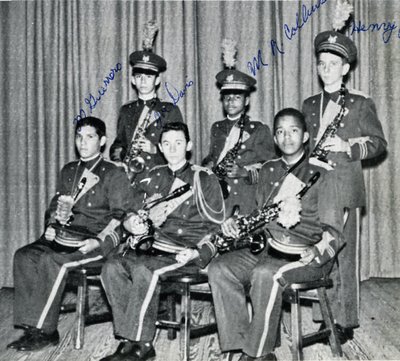Robert Altman - A Cornet & A Bb Clarinet
Monday, February 02, 2009

My concept of music and sound was just about like everybody else's until sometime around 1959 when Brother Edwin Reggio CSC looked at me straight in the face and said, "I need an alto saxophone player for the school band and you are going to be it." Even though he was not taller that I was, he was strongly built and I felt I could not refuse the man.
I was never anything more than an efficient player. I could get a very sweet and mellow sound from my instrument but I compensated adversely by not reading music well. I was good enough not only to play for the school band but also for the special swing band. I learned to watch Brother Edwin's short, but well toned arms as he directed us in playing such classics as Sweet Lorraine, Stars and Stripes Forever and Cherry Pink And Apple Blossom White. With the swing band we played stuff like Basin Street Blues and Dixieland tunes that pushed my musical reading limits.
One day I asked Brother Edwin the difference between a cornet and a trumpet. His answer was short and strange, "A cornet blends better with a Bb clarinet." I have long since determined that Brother Edwin was absolutely right." That small musical lesson inspired me to listen to the sounds of different instruments and to discern the differences. In the evenings in our 10th grade dormitory (about 40 students in bunkbeds in a dormitory so Gothic and high that in wet weather I swore I could see clouds drifting into it) our prefect, Brother Rene Lenhard played his favourite classical records. My personal favourite was Ravel's Bolero because almost each instrument (particularly that wonderful trombone)had a solo. It was my "Young Person's Guide to the Orchestra" before I knew the existence of Benjamin Britten or Henry Purcell.
My interest in playing the alto saxophone faded as soon as I left the school. But my rudimentary knowledge of the instrument made me appreciate the tones of such jazz players as Paul Desmond, Stan Getz, Gerry Mulligan, Ben Webster, Lester Young and Zoot Sims. I tried to get clear sounds out of the oboes and clarinets of my fellow band members. I could not. I learned to respect those who play these difficult instruments.
I sailed smoothly from mono to stereo and bypassed quadraphonic recordings. I suffered with the wow and cassettes. By 1970 most of my high school students in Mexico City had heard that my mother was deaf and that somehow she had taught me to lip read. The rumours flew in the school. The truth is that I had developed not only a keen ear for sounds, even from subdued conversations from the last rows of my classroom, but also an ability (one that I retain to this day) of being able to listen to several conversations at the same time.
At about this time I switched from enjoying cowboy, pirate and war movies to the sexier European films of Antonioni and other Italian masters. I remember when Rosemary and I saw the 2001 - The Space Odyssey around 1969 in a brand new Mexico City theatre that had advanced sound. It was exhilerating. It was also at this time that I noticed some advances in how sound was used in films. You would as an example watch a nomad on a camel transversing the side of a sand dune when suddenly you could hear the sounds of a piano. In what seemed a long moment of time the scene would change to an exotic Cairo bar and focus on the hands of a pianist. I found this technique interesting and I liked that it was non-linear.
But I was still shocked sometime in the late 70s when I saw Robert Altman's Nashville. The sound was revolutionary. The sound was like the different simultaneous conversations of my students in class back in Mexico City. At first I thought this director, this Robert Altman (I had never heard of him before) was nuts. Then I began to appreciate that, at long last, someone was recording conversation as it truly happens. Since Nashville I have seen most of his films and I particularly enjoyed watching The Company (2003) with Rebecca a couple of years back. Any film that has a backstage, a stage and an audience (this film was about the Joffrey Ballet) is Altman territory with all those simultaneous conversations behind and in front of the curtain.
Tonight, without knowing that it was an Altman film (but I caught on in minutes) Rosemary and I saw most of his last film, the 2006 A Prarie Home Companion. It has that stage, that back stage, that audience, a recently dead man and a white trenchcoat woman with a double role, she plays an angel and the angel of death. There was no cornet or clarinet in sight but I appreciate to this day Brother Edwin's lesson. He taught me not only the value of sound but to appreciate its importance in the making of a good film.
In the picture above, taken by Brother Edwin with his Konica in 1960, that's me, top left.






